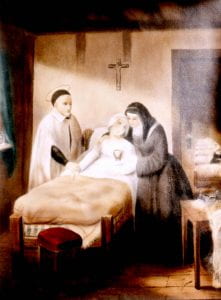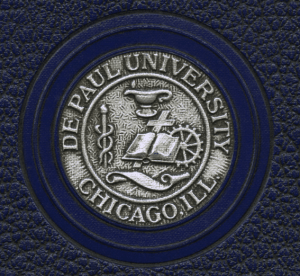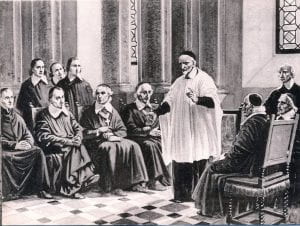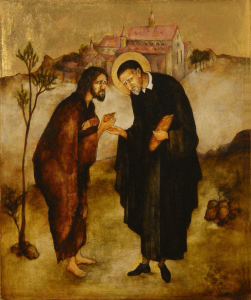By Rev. Robert Maloney, C.M.
Listen to this post:
 St. Vincent was no stranger to pandemics. On perhaps no other topic were his emotions so deeply stirred. Outbursts of the plague ravaged Europe frequently during his active years, taking the lives of many whom he loved. Marguerite Naseau, whose story he often told and whom he always regarded as the first Daughter of Charity, succumbed to the plague at 27, even before the Daughters were recognized juridically.(1) Lambert au Couteau—of whom Vincent once said “the loss of this man is like having me tear out one of my eyes or cut off one of my arms”(2) and whom he sent to establish the Congregation of the Mission in Poland—died serving the plague-stricken in Warsaw in 1653. Antoine Lucas, much admired not only by Vincent but also by other founders of religious communities at that time, died from the plague in Genoa in 1656.(3)
St. Vincent was no stranger to pandemics. On perhaps no other topic were his emotions so deeply stirred. Outbursts of the plague ravaged Europe frequently during his active years, taking the lives of many whom he loved. Marguerite Naseau, whose story he often told and whom he always regarded as the first Daughter of Charity, succumbed to the plague at 27, even before the Daughters were recognized juridically.(1) Lambert au Couteau—of whom Vincent once said “the loss of this man is like having me tear out one of my eyes or cut off one of my arms”(2) and whom he sent to establish the Congregation of the Mission in Poland—died serving the plague-stricken in Warsaw in 1653. Antoine Lucas, much admired not only by Vincent but also by other founders of religious communities at that time, died from the plague in Genoa in 1656.(3)
Tragedies piled up in Vincent’s life, especially in the 1650’s. He often spoke of “war, plague and famine” as the scourge of the poor. In addition, there were persecutions in Algiers, Tunis, Ireland, and the Hebrides. The Congregation of the Mission’s first martyr, Thaddeus Lye, a seminarian, gave his life in Limerick in 1652.(4) His persecutors crushed his skull and cut off his hands and feet in the presence of his mother. When in 1657, on top of hearing that three priests had died on their way to Madagascar, Vincent received news that six members of the house in Genoa had succumbed to the plague, he described himself as “overwhelmed with sorrow” and added that he “could not receive a greater blow without being completely crushed by it.”(5)
In his letters and conferences, Vincent mentioned the plague more than 300 times. He sent lengthy letters offering practical advice about helping plague victims to his friend, Alain de Solminihac, the Bishop of Cahors,(6) and to the superiors in Genoa(7) and Rome.(8) In his talks, he described the plague in France, Algiers, Tunis, Poland, and throughout Italy.
The dimensions were staggering. France alone lost almost a million people to the plague in the epidemic of 1628-31. In roughly the same period in Italy, 280,000 died. In 1654, 150,000 inhabitants of Naples succumbed. Algiers lost about 40,000 people in 1620-21, and again in 1654-57.
Genoa was among the hardest hit. Half the city died in 1657. The long list of members of the Vincentian Family who lost their lives there is touching.
As one might imagine, the Daughters of Charity and the Confraternities were on the front lines in ministering to those afflicted by the plague (not to mention their service to those whose lives were disrupted by war, famine, and political strife at the very same time). Some of what Vincent said to his priests, his brothers and his sisters, as well as to the lay women and men in the confraternities, is colored by the circumstances of the times and by the lack of the medical knowledge and resources that we have today. But much of what he said and how he reacted is quite relevant to members of the Vincentian Family as they confront COVID-19 today.
Here, let me highlight four points:
- As he struggled with painful emotions, Vincent remained convinced that, no matter what the circumstances, we must never abandon the poor. They are our “our portion” in life, he stated. He was firm in telling the members of his Family that, even in extremely difficult circumstances, we must be creative in finding ways to tend to the needs of the suffering. Vincent wrote to Alain de Solminihac, “The poor country people stricken with the plague are usually left abandoned and very short of food. It will be an action worthy of your piety, Excellency, to make provision for this by sending alms to all those places. See that they are put into the hands of good pastors, who will have bread, wine, and a little meat brought in for these poor people to pick up in the places and the times indicated for them… or to some good layperson of the parish who could do this. There is usually someone in each area capable of doing this act of charity, especially if they do not have to come into direct contact with the plague-stricken.”(9)
- Vincent’s evangelical interpretation of events came to the fore rapidly in such times of crisis. In December 1657, thinking of eleven members of his Family who had recently lost their lives, he wrote: “There are so many missionaries we now have in heaven. There is no room to doubt this, since they all gave their lives for charity, and there is no greater love than to give one’s life for the neighbor, as Our Lord has said and practiced. If, then, we have lost something on the one hand, we have gained something on the other, because God has been pleased to glorify our members of our Family, as we have good reason to believe, and the ashes of these apostolic men and women will be the seed of a large number of good missionaries. At least, these are the prayers I ask you to offer to God.”(10)
- In advising the members of his Family about how to serve in the midst of the plague, Vincent chose a middle ground. On the one hand, he urged them to stay near the plague-stricken and not abandon them; on the other hand, he encouraged the Family to observe the cautions that civil and ecclesiastical leaders were recommending. He told Etienne Blatiron, the superior in Genoa, “The only thing I recommend most earnestly and ardently to you is to take all reasonable precautions to preserve your health.”(11) Blatiron took numerous risks and died from the plague in 1657. Vincent wrote to Jean Martin, the superior in Turin, “I am concerned that you took only a short rest and went back to work so soon. In the name of Our Lord, please moderate what you do and get all the help you can.”(12) Martin lived on and served energetically until 1694.
- He expanded the definition of a martyr to include all who valiantly gave their lives for the poor, and he never ceased singing their praises. Speaking of the Daughters of Charity, he said, “A holy Father once said that anyone who gives himself or herself to God to serve their neighbor and willingly endures all the difficulties that they may encounter in this is a martyr. Did the martyrs suffer more than these Sisters… who give themselves to God (and) are sometimes with sick persons full of infection and sores and often noxious body fluids; sometimes with poor children for whom everything must be done; or with poor convicts loaded down with chains and afflictions… They’re far more worthy of praise than anything I could say to you. I’ve never seen anything like it. If we saw the spot where a martyr had been, we’d approach it only with respect and kiss it with great reverence. Look upon them as martyrs of Jesus Christ, since they serve their neighbor for love of Him.”(13)
Today, we face what, for most of us, is an unprecedented crisis, as we confront COVID-19. How might we deal with it in St. Vincent’s spirit? May I suggest three things:
- Volunteer service. The poor suffer most in crises like this. Often, they find themselves jobless. They need lodging, food, and other essential services. Our Family has a long history, from St. Vincent’s time to the present, in providing such necessities. One can only admire the doctors, nurses, emergency medical technicians, home visitors and others who continue to serve those currently suffering.
- Donations. The stock market and other economic indices have plunged dramatically in this period. Some take that as a signal to be wary about giving. But the needs of the poor are all the greater in times like this. Can we as a Family continue to be generous to the neediest?
- Prayer. Pope Francis and many other religious leaders are summoning us to pray for victims and for an end to the pandemic. Some beautiful prayers have been composed. Besides these, may I offer this suggestion from St. Vincent: “God himself tells us, ‘A short, fervent prayer pierces the clouds.’ (Sir 35:17) Those darts of love are very pleasing to God and, consequently, are highly recommended by the holy Fathers, who realized their importance. That’s what I urge you, my sisters and brothers.”(14)
Notations added and this text produced by the
DePaul University Vincentian Studies Institute.
March 31, 2020
Download this post
- Naseau’s death is mentioned in a notation to Letter 176, To Saint Louise, [Between 1634 and 1636], in Pierre Coste, C.M., Vincent de Paul: Correspondence, Conferences, Documents, and translated by Jacqueline Kilar, D.C., Marie Poole, D.C., et. al., 14 vols. (New York: New City Press, 1985–2014), 1:241, n. 2. Hereinafter cited as CCD. Online at: https://via.library.depaul.edu/vincentian_ebooks/25/
- Letter 419, To Saint Louise, In Angers, Parish, 17 January 1640, CCD, 2:10, n. 1. Online at: https://via.library.depaul.edu/vincentian_ebooks/27/
- Letter 26, To Pope Urban VIII, CCD, 1:39, n. 4. Online at: https://via.library.depaul.edu/vincentian_ebooks/25/
- Letter 1473, To Lambert aux Couteaux, Superior, in Warsaw, 22 March [1652], CCD, 4:342. Online at: https://via.library.depaul.edu/vincentian_ebooks/29/
- See Letter 2352, To Jacques Chiroye, Superior, in Luçon, CCD, 6:440. Online at: https://via.library.depaul.edu/vincentian_ebooks/31/
- See Letter 1572, To Alain de Solminihac, Bishop of Cahors, [November 1652], CCD, 4:500-503. Online at: https://via.library.depaul.edu/vincentian_ebooks/29/
- See Letter 2111, To Étienne Blatiron, Superior, in Genoa, 28 July 1656, CCD, 6:52-53. Online at: https://via.library.depaul.edu/vincentian_ebooks/31/
- See Letter 2122, To Edme Jolly, Superior, in Rome, 11 August 1656, CCD, 6:63. Online at: https://via.library.depaul.edu/vincentian_ebooks/31/
- Letter 1572, To Alain de Solminihac, Bishop of Cahors, [November 1652], CCD, 4:502. Online at: https://via.library.depaul.edu/vincentian_ebooks/29/
- See Letter 2483, To Dominique Lhuillier, in Crécy, Paris, 11 December 1657, CCD, 7:19. Online at: https://via.library.depaul.edu/vincentian_ebooks/32/
- Letter 2174, To Étienne Blatiron, Supeior, in Genoa, 1 December 1656, CCD, 6:156. Online at: https://via.library.depaul.edu/vincentian_ebooks/31/
- Letter 2184, To Jean Martin, Superior, in Turin, Paris, 29 December 1656, CCD, 6:172. Online at: https://via.library.depaul.edu/vincentian_ebooks/31/
- See Conference 27, The Practice of Mutual Respect and Gentleness, 19 August 1646, CCD, 9:214. Online at: https://via.library.depaul.edu/vincentian_ebooks/34/
- See Conference 5, Fidelity to Rising and Mental Prayer, 16 August 1640, CCD, 9:32. Online at: https://via.library.depaul.edu/vincentian_ebooks/34/









